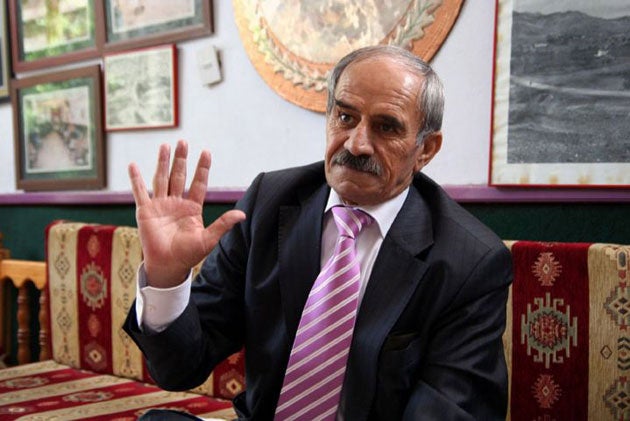The man who heals deadly Kurdish feuds

Ibrahim Tekin's problems began when a friend lent him his wife's three gold bracelets to shore up his failing restaurant business. Two days later, the wife's family told him to hand them back: the bracelets were part of a dowry. Mr Tekin could not. He had pawned them. In the ensuing brawl, he stabbed one of his assailants in the heart.
The vendetta triggered, Mr Tekin did what hundreds of Kurds had done before him, he called in the man the locals call "Diyarbakir's Kofi Annan". A 65-year-old former butcher, Sait Sanli has brokered more than 500 deals between feuding families in the past decade, and is determined to stamp out a tradition central to Kurdish society.
"So much blood is spilt over problems not big enough to fill a walnut shell," says Mr Sanli, in his funeral parlour in Diyarbakir's old town. "But feuds are like a snake; they bite for a nothing."
After the bloodiest months of fighting since the separatist Kurdistan Workers Party restarted its 25-year war against the Turkish state in 2004, many of the men sitting in the funeral parlour think Turkey would do well to copy Mr Sanli's "sweet tongue". With tit-for-tat murders of Turkish soldiers and PKK members stoking hatred on both sides, they compare the war to a gigantic blood feud.
Asked to explain his success, Mr Sanli laughs. "It's certainly not my looks." Barely 5ft tall, he has the slight stoop and cough of a former heavy smoker. "Around here, they say that 'A sweet tongue can even persuade a snake out of its hole'," he says. "I kiss hands. I berate. I shout. Sometimes, I cry. Above all, I listen to everybody involved, even the children."
He gives the example of a feud he helped to patch up in 2002. A Diyarbakir woman, moving 500 miles west to the tourist city of Antalya after her husband was murdered, spent the next 15 years laying an extra place at table. It was her way of reminding her two sons, toddlers at the time of their father's death, of their obligation to avenge him. "In many ways, she was rebelling against her in-laws' attempts to impose their solution on her," Mr Sanli says. "The job of revenge should have fallen to them. To avoid that, they tried to get her to accept derisory blood money."
A day after Mr Sanli told the woman he had persuaded the murderer's family to pay her $15,000, she rang him to say she had slept soundly for the first time since her husband's death. "She had been mourning her husband, but she was also mourning her children's ruined future," Mr Sanli says.
In the case of Ibrahim Tekin, this widely respected man's magic seems to have worked. Recently, he was joined at his breakfast table by spokesmen for the feuding families. The atmosphere was friendly. There was much shaking of heads over the impetuousness of the young. Both sides were evasive, but an agreement over blood money seemed near.
"Sait is the crown on our heads," says Bayram Guclu, a notable from Mr Tekin's village who is mediating between the families. "He has taught us the value of the language of compromise."
Subscribe to Independent Premium to bookmark this article
Want to bookmark your favourite articles and stories to read or reference later? Start your Independent Premium subscription today.

Join our commenting forum
Join thought-provoking conversations, follow other Independent readers and see their replies